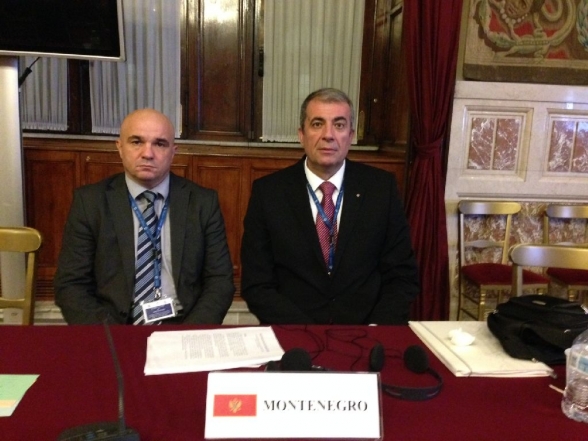Chairperson of the Committee on Health, Labour and Social Welfare Mr Zoran Jelić and member of the Committee Mr Janko Vučinić participated in the Meeting of Chairpersons of Committees Specialised on Employment, Research and Innovation, held in Rome on 21 and 22 November, within Italian presidency of the European Union.
During day one, participants discussed topics titled: “The European way to stable and high-quality employment” and “Digital Opportunities”. It was jointly assessed that the situation on the market is alarming, particularly when it comes to long-terms unemployment, youth unemployment, unemployment of those aged over 50 as well as employment contracts of employees. The participants concluded that it was necessary to work on improving the employment conditions by stimulating small and medium enterprises in order to decrease unemployment, which resulted from the economic crisis. Additionally, the fact that there is a great mismatch of labour supply side and labour demand indicates that that member states must deal with this question more seriously. Within the second session participants discussed possibilities and changes which may result from digital economy. The focus was on the Digital agenda, whose aims should be fulfilled by 2020. Discussants emphasised that Europe has to adapt to changes carried by digital era, investing primarily in infrastructure necessary for achieving better broadband connection. The construction of digital infrastructure could create 1.2 million jobs and will increase Europe’s GDP by 5%.
On day two of the meeting, topics of discussion were: “Research: an engine for growth” and “Cities as drivers of innovation”. Representatives of European Union countries expressed concern over the fact that Europe did not invest enough in the research, which has placed Europe at a disadvantage when it comes to competitiveness in that area. Given the fact that Europe has the largest internal market in the world and that it is home to many of the world's leading innovative companies, and has a leading position in many fields of knowledge and key technologies, participants emphasised that was was necessary to achieve goal set by Europe 2020 - spending 3% of GDP on research and development for the Member States. In this way, Europe will strengthen its competitiveness as well as its place in the world when it comes to innovation and technological development. As one of the measures to achieve this objective, it is necessary to provide better working conditions for researchers, greater connectivity of university units and private sector interested in the research, while the curriculum should introduce research from an early age, providing at the same time continuous training for teachers to work in this field.
Within the last, fourth session, participants discussed the potential of European cities and the ways in which they can foster innovation. The concept of the so-called "smart city" is something that Europe should focus on, in order thus to fully valorise the value of its cities. European cities are small or medium size when compared to world capitals, but to make the best use of cultural and historical heritage they possess, it is necessary to focus on the fact that citizens know how to use the possibilities offered by new technologies, not only to work on equipping the cities with smart devices. Given that the number of inhabitants living in the metropolitan area is on the rise, the European Union recognises the investment in urban areas as a priority.
The meeting was attended by representatives of committees of parliaments of the EU member states and candidate countries for the EU membership.









